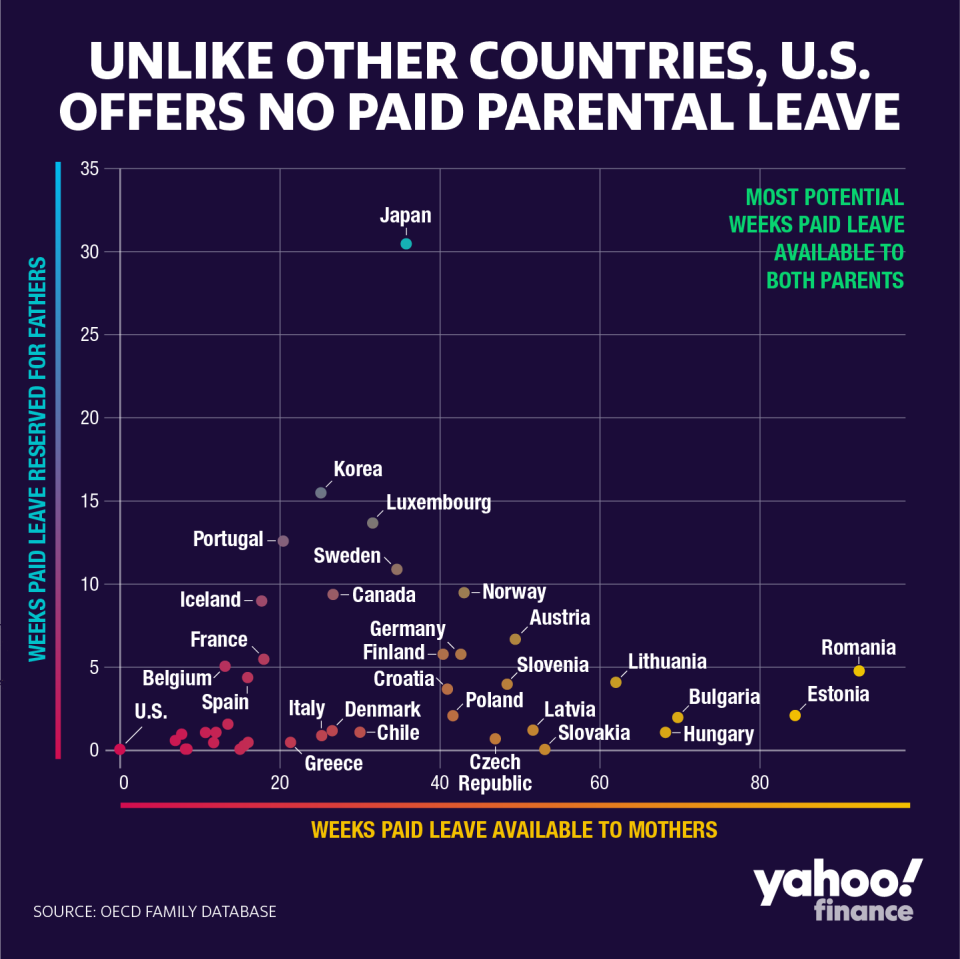AOC has a point: U.S. parental leave policy is shockingly bad compared to the rest of the world
Rep. Alexandria Ocasio-Cortez (D-NY) made stark comments on U.S. paid family leave policies recently, telling a congressional hearing that existing policies “treats people worse than dogs.”
And based on available data about parental leave policies of countries around the world, the congresswoman from the Bronx has a point.
Ocasio-Cortez criticized the limited access Americans have to paid family leave, which is commonly six-to-eight weeks and mostly come from policies from employers and eight states implementing or passing related laws.
“At a bare minimum, we need to fight for 3 months paid family leave in the United States,” Ocasio-Cortez tweeted last week. “Ideally, I believe we should have 6-12 months of paid leave - just as many other industrial nations do.”

U.S. at the bottom
The U.S. is at the bottom of the paid family leave rankings worldwide, lagging high- and middle-income economies and Organisation for Economic Co-operation and Development (OECD) countries. Even the three-month minimum leave proposed by Ocasio-Cortez wouldn’t bring the U.S. anywhere close to the top, and making the common six-to-eight weeks of paid family leave accessible to everyone would not move the U.S. from the bottom of the list.
As it stands, the U.S. is the only developed country that doesn’t guarantee paid leave to new mothers and ranked last among 41 high-and middle-income countries worldwide, in a recent study by the United Nations children's fund UNICEF. In fact, out of the 193 countries in the United Nations, only three do not provide statuary nationwide paid family leave policy: Papua New Guinea, Suriname, and the U.S., according to the WORLD Policy Analysis Center.
“There is no country that's anywhere near the United States in terms of its national wealth or level of development that doesn't have a nationwide statutory family leave entitlements,” Dr. Yekaterina Chzhen, lead author of the report by UNICEF, told Yahoo Finance.

In Canada, in addition to 15 weeks of paid maternity leave, the mother and the father are allowed by law to take up to 35 paid weeks of standard parental benefits when a baby is born or adopted. The parents can share and split the leave between them however they choose.
“For the U.S., there's so much to learn from the rest of the OECD, but the most obvious comparison would be Canada,” Dr. Chzhen said. “Canada now has both maternity leave that is reasonably generous even by EU standards, and since March 2019 it also has special parental leave entitlement for fathers.”

Bipartisan support for paid family leave for federal workers
It’s not only Ocasio-Cortez talking about paid family leave these days. The White House also hosted a summit on childcare and family leave with Ivanka Trump, where President Trump called for expanded access to family leave and childcare.
“An estimated one out of every four American moms returns to work within two weeks of giving birth because they cannot afford to miss a paycheck or risk losing their job.” President Trump said at the event. “We want every mother to have the chance to spend those precious few weeks with her newborn or adopted child.”
Last week, the House of Representatives passed a National Defense Authorization Act (NDAA) that includes a provision providing paid family leave to 2.1 million federal workers.
The bill will include a policy granting 12 weeks of paid parental leave to federal workers and has bipartisan support.
“The fact that this is a bipartisan bill, it's really evidence of how popular paid family leave is and how much we need it in this country,” Amy Traub, an associate director of policy and research at Demos, a liberal think tank, told Yahoo Finance.

Paid leave policies have been expanding across the U.S.
The majority of Americans support the notion that the employers should cover the cost of paid family leave. However, there’s a question about whether the government should require employers to provide paid leave or if they should decide for themselves, according to a 2017 report by Pew Research Center.
On a state level, paid family leave policies have also been expanding. In California, New Jersey, Rhode Island, and New York, workers are currently receiving benefits under their state paid family leave policies.
The District of Columbia, Massachusetts, Washington, Connecticut, and Oregon have all passed laws and will implement paid family leave polices in the coming months or years. Those state policies provide up to 12 weeks available for mothers and fathers.
Despite the action on the state level, the U.S. is still lagging behind the rest of the OECD countries, according to Dr. Chzhen, as the policies are only in a few states and “a lot less generous” compared to what other OECD countries offer.
“Starting from a low level also means that you can leapfrog and you can go for a policy mix that is quite generous and well-thought,” Chzhen said. “There is an opportunity there, somebody has to take it and bring it to a conclusion. It's very nice that Representative Ocasio-Cortez has put it on the agenda.”
Denitsa is a writer for Yahoo Finance. Follow her on Twitter @denitsa_tsekova.
Read more:
Follow Yahoo Finance on Twitter, Facebook, Instagram, Flipboard, SmartNews, LinkedIn, YouTube, and Reddit.

 money
money 
